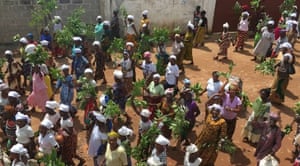Khadija Balayma Allieu sits on her hospital bed, grimacing at every movement of her legs. It has been five days since she was forcibly genitally mutilated, she says.
As she receives treatment in the eastern Sierra Leonean town of Kenema, Khadija, 28, recounts what she went through at the hands of five cutters. She is now in hiding because the soweis – as the cutters are known locally – are looking for her.
Khadija says she was blindfolded and held by five or six women. “They gagged me as I shouted. Then [one of them] started cutting. They held my head down. I started bleeding profusely. I tried screaming but there was cloth inside my mouth.”
Khadija, the mother of a 12-year-old boy, says she was left locked inside the house for four days “without food or medicine”. Eventually, the police were alerted. They raided the house, extracting her through a smashed window.
As Khadija explains her nightmare, she constantly wipes away tears and turns her sunken eyes towards the window, to be sure no one is coming to get her. She is in genuine fear for her life.
The woman accused of cutting her, Elsie Kondoromoh, is an influential figure in Sierra Leone. Initially detained by police, she was released when hundreds of cutters mounted a protest outside the police station. Kondoromoh’s supporters have been to the courthouse to make a case for legal investigations against her to be dropped.
Police inspector Marty Tarawille said: “[Kondoromoh] was with us [at the police station] but the sowei people came in numbers …They were singing, they were shouting that we should leave that lady [alone] … If we had not released her it would have been a problem for us in this station.”
The case highlights the challenges facing anti-FGM campaigners in Sierra Leone. The minister for social welfare, Sylvia Blyden, has said the government’s focus is on children under 18. This is seen as leaving adult women free to decide what they do with their bodies.
— diasporan hands (@diasporanhands) September 16, 2016
Sierra Leone minister on fgm pic.twitter.com/aGJi4Sy7Es
FGM has been banned in the country since emergency health measures were introduced after the Ebola outbreak in 2013. But despite the continued ban, the practice has returned through all-female secret societies, the Bondoand condemnation by the authorities has become increasingly absent.
In August, a young woman died in the northern town of Makeni shortly after undergoing the procedure, prompting the arrest of several soweis. In another recent case, police say children were rescued from a disused house in Magburaka, also in the north, after undergoing an initiation ceremony.
The World Health Organisation estimates that 88% of women in Sierra Leone between the ages of 15 and 49 have undergone FGM.
That the women who converged on the police station were able to secure Kondoromoh’s release is indicative of the power soweis wield in Sierra Leonean culture. Civil society organisations have called for Khadija to be evacuated from the town, expressing concern for her safety, but fear of the soweis is such that campaigners are afraid to come to the fore.
“The soweis are so powerful that nowhere in Sierra Leone will be safe for her again,” one activist says.

Kondoromoh, who is national vice-president of the Sowei council, admits she carried out the procedure but says she did not force Khadija to go through with it. She claims Khadija asked for it.
“She met me at home saying she was being taunted by her fellow women because she had not been circumcised,” says Kondoromoh. “She came to me to initiate her and asked how much it would cost. I told her that I did not want anything from her because she was being provoked. I took her to a nearby society bush to initiate her”.
Kondoromoh says Khadija asked to stay with her until she recovered because she would be taunted if she went back home: “I bought her provision. I woke up every morning to prepare food for her before leaving home.”
Medics treating Khadija say her condition is improving, but predict it will take some time for her to heal both medically and psychologically. One nurse described her as “badly traumatised”.
“With elections in early 2018, it is unlikely the government will take any serious action against the soweis, who will now be emboldened by their apparent success in having their way,” says a local journalist whose radio station has been threatened if it continues to cover the issues surrounding FGM.
He believes that even if the matter reaches court – “which is unlikely” – the victim will be in danger if she testifies.
Captured and cut: FGM returns to Sierra Leone despite official ban | Umaru Fofana
Hiç yorum yok:
Yorum Gönder